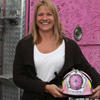When you have cancer, many people are involved in treatment, support and just being there for you at every turn. Our bloggers rely not only on their treatment teams, but also on armies of friends, family members and co-workers who have their backs. In these posts, you’ll read about Milwaukee firefighters who sat with their co-worker while she received seven-hour chemo treatments, organizations like the Pancreatic Cancer Action Network, countless family members, and even some wise thoughts about friends who didn’t seem supportive. Read below as our bloggers wrote on the following question: Who has been your “rock” throughout your cancer experience, and how?
-
Sue Northey
Diagnosis: Hodgkin's Lymphoma
My rock throughout my cancer experience was my family. My husband simultaneously played the role of dad and “Mr. Mom” to our three young children and never once complained. My father called me every single day to check on my progress and bolster my spirits. My sisters constantly kept me on their radar screens.
My friends dropped off food, babysat for our children and sent me gifts, balloons and flowers to brighten my day. I truly was blessed. I constantly wondered what I had done to receive so much love, support and kindness.
What was unexpected were the few people in my life that turned their backs on me. It took years for me to realize that it was their way of coping with my threatening diagnosis. They were frightened and chose to retreat rather than face the situation. It hurt me at first (admittedly a lot), but now I realize it had nothing to do with their love for me. Like the rest of us, they were just scared.
-
Beth Dowhen
Diagnosis: Squamous Cell Carcinoma
My rock? My goodness, I had a quarry full, from boulders to pebbles! When learning of a friend's cancer diagnosis, people often think there really isn't much they can do, but I can tell you that every kindness matters, no matter how small.
God placed small stones and large into what felt like a deep quarry from which I might not emerge. My husband was my rock. He was there from the moment we heard the diagnosis, through every chemo and radiation treatment, and when we heard those wonderful words, “You are cancer-free.” My children kept me motivated through texts, bouquets and hugs. Family, friends and church members sent cards, soup, devotion books and prayers. A cousin and a niece brought gift bags full of thoughtful items to make me more comfortable.
There was some wonderful and totally unexpected support as well. The faculty of Wisconsin Lutheran High School, where I had taught, provided three months of meals for our family. My co-worker April delivered them twice a week, along with the latest school news. Denise, another co-worker, sent a card with a handwritten message every week. The butcher at the store where we shopped pressed some cash into my husband's hand one day and said he was praying for us.
The American Cancer Society online discussion board provided practical advice from people who had been through similar treatments.
No piece about support could be written without mention of my team at Elmbrook Cancer Center. Their expertise, compassion and humor helped our family through a challenging time.
When God created oncology workers, he used extraordinary ingredients!
-
Rodney Schroeter
Diagnosis: Gastrointestinal Stromal Tumor
Obviously, my wife was my primary support. She’s been a nurse for many years, and as such, she understands the importance of being an advocate for the patient. She knew enough to ask questions I never would have (such as, “Why is a CAT scan better than a PET scan to detect whether this type of tumor has returned?”).
Of course, there was never an instance when she came into my hospital room and ordered anyone to do anything differently. Everyone in charge of my well being at Froedtert was a professional who knew exactly what should be done. And each one was very encouraging. So I’d have to say the staff people I saw each day provided significant support, as well.
Equally important in their support were the two surgeons who removed my GIST tumor, as they followed up with me after the surgery: Drs. Fabian Johnston, and Dr. Kiran K. Turaga. Thanks, everyone!
-
Kristin Ciganek
Diagnosis: Colorectal Cancer
I have always been a very stubborn and pigheaded person, so when I was diagnosed with cancer I thought I would be able to handle things by myself. I am not one to ask for help - - to me it showed that I was weak.
That attitude didn't last long. It would have been impossible for my husband and I to be on this journey alone. I am blessed to have a large family, an even larger extended family in the fire department, some great friends and unbelievable parents in the schools my kids attend.
In the beginning the guys from work would take turns sitting with me at chemo (my first couple months my chemo infusion was about 7 hours), my friends and family never let me go to a doctor appointment alone. When I was sick from chemo and could barely get out of bed, a supper would appear. The parents at school always help out with bringing the kids home if we run into a jam because of appointments or sudden hospitalizations and were always making sure the kids got extra hugs and kisses when I was in the hospital or sick.
I have been fighting this for almost three years and still cannot believe the amount of support I still get. People always tell me that I have such a positive attitude, that I am never in a bad mood. It is because of all the people I have behind me. Without them there is no way I could be dealing with this roller coaster.
I believe that it is important to have some kind of a support system. I realize that what works for one person may not work for the next. I am not the kind of person that can go to a support group and open up, but that may be exactly what the next person needs. I know that not everyone is as lucky as I am, to have such a large group to draw from. Know that there are people out there that want to help you, want to support you. You just have to find them and let them in.
-
Paul Lawonn
Diagnosis: Mantle-Cell Lymphoma
This is a very good question to ask of cancer patients. It is a question that gets right to the heart of the issue: You have cancer – now what?! We’ve already talked about not over-dosing on information found on the Internet because it will leave you thoroughly exhausted and exasperated. Moreover, there is a very good chance that much of what you read will be based on opinions instead of scientific facts and pure data. The Internet will not be that ‘rock’ you are looking for as you approach and push-through this battle.
What was my rock? Two things: my faith in God and my wife. In my "Seven Steps to Persistent Perseverance" document there are two steps that relate directly to this question and why those steps became so important for me. Step 3 says, “Cling to Faith.” That statement is twofold: faith in God and faith in your medical team. From the day of diagnosis, I did put all my hope and trust in my God and in His Word. I did believe that all things would work out for the good. I did not know how this would happen but I did know my God is faithful and I could put my faith in Him. Over the nine years I battled cancer, there were many times when the last strand of hope to grasp was my faith in God.
Along with faith in my God, I learned quickly that I could trust my medical team as well. This was not just my oncologist but everyone involved in my treatment regimens, hospital care, or diagnostic work. All of these wonderful people are on the frontlines of cancer battles every day, and their knowledge, insight, counsel and advice became invaluable to me. When I had questions, was feeling down, or just needed an emotional “hug,” they were always there for me.
An unexpected reality about my medical team began to surface quickly: Not only did they care FOR me but, more importantly, the cared ABOUT me. What great people! Step 4 of my Seven Steps of Persistent Perseverance says, “Find a Reason to Fight.” A cancer diagnosis is unlike any other battle you’ve had in your life. It demands mental toughness and singleness of mind. For all cancer will throw at you, you must have a reason to fight cancer in order to persistently persevere.
Mental toughness and singleness of mind come when you have a strong reason to fight and survive. Many cancer treatment regimens can be a battle in and of themselves. There will be times when you wonder if you have the strength for another chemo cycle. With a strong enough reason to win, you’ll push through. My reason to fight was very simple: my wife was not going to be a widow! I resolved that I would fight through hell to make sure that was always a reality. In my nine- year battle with cancer, I went through numerous cycles of chemotherapy, two brain surgeries, brain radiation treatments, and a stem cell transplant that pummeled my body. As I kept my reason to fight in sight, I was able to find the strength necessary to tackle each challenge and each battle. Fixed on that single reason to fight, I was able to keep moving forward with persistence and a positive mental attitude.
For example, I remember when I was in the hospital recovering from my stem cell transplant. One of the requirements was daily activity – walking around the floor. I hated that task because my energy level was incredibly low and laps were such a big challenge. But I knew that if I didn’t do my laps I would not get better and hospitalization would continue. Keeping my reason to fight in sight, I mustered up the strength I needed and kept beating the lap goal each day – oftentimes with my wife right at my side, cheering me on.
So, my rock throughout this entire experience has been my faith in God and my wife. Drawing strength from God’s Word, I was able to fight every battle because my reason to fight this disease remained so very strong. I can’t overstate the value of having a strong reason to fight and the will to survive.
-
Kelley Fox
Diagnosis: Chronic Lymphocytic Leukemia
My rock, during this whole ordeal of CLL to bone marrow failure to bone marrow transplant and recovery has been my wife. Nancy has been there every step of the way with me and suffered as I suffered through each chemo treatment, blood and platelet transfusions, shots for stimulating platelets and neutrophils. Each trip to the hospital, she was there with me.
Our family made sure that everything was okay at our house and volunteered to mow the lawn, plow the snow and clean the house when I could finally come home from the hospital. My sons rented Corvettes for me to drive when I was in Arizona and couldn't come home because of the bone marrow failure. They showed up on our doorstep with these beautiful little cars and I got to drive them for the week, when I was able.
Our close friends would come out to Arizona to spend time with us and to help us out in any way they could. All the visitors lifted my spirits and gave Nancy a good outlet away from me.
One of the best sources of support was the Caring Bridge website which was a godsend. It is a free website for families going through serious illnesses. It allows friends and families to view updates freeing the families from having to make numerous phone calls and computer updates to friends and family. Nancy started writing on Caring Bridge every night or when there was a milestone with my treatments. She would write each day to let all of our friends know what was going on during the whole ordeal. Friends and family could then leave encouraging words that would help me through the tough times. It was amazing to read all of the comments and words of encouragement that came every single day from people I worked with, people from our church, dear friends from the past and present, former classmates and former students and basketball players that I coached.
To go through this without a strong support group would have been very hard for me. It lifts your spirits to know that people care enough to write and encourage you to keep on fighting. The greatest gift was to learn of how many people truly cared about me and were praying for me. Knowing that so many people were including me in their prayers overwhelmed me.
-
Jack Henning
Diagnosis: Stomach Cancer
My Lord has been my Rock throughout this cancer experience. Psalm 61 says, “Lead me to the rock that is higher than I. For you have been my refuge, a strong tower against the foe.”
God has given me a calmness and a peace that I can't explain during the discovery of the cancer and throughout the ups and downs of this cancer experience and other medical problems I had this past year. He provided me with a surgical team that was highly qualified and confident, and who made changes during the surgery as they discovered the cancer had spread to other organs.
This surgical team is very supportive today in aggressively monitoring my health on a quarterly basis. Nurse Jennifer Merrill will return a phone call promptly to answer a question or concern.
My spouse provided the special diet for me and was always positive, from the discovery of the cancer until today, as we continue to enjoy doing things together.
I was also surprised at the number of friends and family who would call and visit me to wish me the best, and who took an interest in my recovery.
-
Jennifer Kelliher
Diagnosis: Sarcoma - Desmoid Tumor
As I was being passed into the MRI machine for my routine screening yesterday, it seemed like the perfect time to give some thought as to how to answer this question.
(MRI Side Note: If the lack of space in an MRI bothers you, just close your eyes. It sounds so simple, but it really works! Close them before they pass you into the machine. Then picture yourself lying somewhere expansive, like a meadow or the beach. It is funny how after only a few minutes, you really can trick yourself into feeling like you’re somewhere else. Then all you have to do is resist the urge to open your eyes… and if you have abdominal scans like I do, follow the breathing instructions!!)
On to my support system – which honestly took much of my hour in the MRI machine to really feel like I had recalled everyone. The size of your support system will largely depend on how open you are about what is going on with your health, which is certainly a personal choice. I chose to share what was going on with my health with three main groups: family and close friends, co- workers, and my chorus friends – each for different reasons.
I’m very close with my family, so it was second nature to share what was going on with them. While I didn’t want them to worry, I knew I would need their love, prayers and support. My husband was my rock – keeping me laughing and helping out so much along the way. He did have a tough time with certain aspects of my recovery, though. I had four JP drains for about a month after surgery, and he didn’t get up the courage to help with them for a little while. Then of course once he did, he was all, “...hmmm, that wasn’t so bad…”! My mom was a huge help, staying with us for a while and helping with everything from meals to taking me to physical therapy, and my mother-in-law also took a turn staying with us. Between the three of them, they were my core support system and certainly my main keys to recovery.
I also chose to be open with co-workers about what was going on. I am a manager, and have been at my firm for about 15 years, so I’m known throughout the firm. I didn’t want people to wonder what was going on about my absence; I preferred to simply tell them up front and keep them posted. My manager was kind enough to pass along updates on my recovery throughout, and my team of direct reports blew me away by arranging meal delivery. We received their home cooked meals twice a week for about two months. I never expected that, and it helped out so very much. My chorus friends were also so supportive. If you watched my video bio, you got to see them in action, and they are just a great group of women. Collectively, we could probably say we’ve “been through it all” – so when any of us hit hard times, the rest of the group is there to support you. For that very reason, I didn’t even think twice about telling them. They sent cards and emails all throughout my recovery, and even visited and sang. I can’t say enough about this fantastic group of women!
Probably the most important support I received though from all three groups was their prayers. Even right now I’m getting a little emotional as I write this – I can’t tell you how many people told me at some point that they were praying for me. Some very unexpected people, too – like a co-worker halfway across the country who told me she and her daughters had been praying for me. It was and still is very touching. I know as some of you read this, you may not believe in the power of prayer. And that’s okay. Just know that at some point in your journey, it’s very likely someone will be praying for you. And whether or not you believe in that, just let them. It certainly can’t hurt.
-
Veron Gray
Diagnosis: Dedifferentiated Liposarcoma
My support came from my husband, who accompanied me to every appointment and stood by my side, my family and friends who prayed for me, and most importantly my faith in God.
I trust God for my health and believed that whatever I had to go through he was going to take me through the situation. With that knowledge my mind was at ease.
-
Jeanette Joseph
Diagnosis: Papillary Thyroid Cancer
A strong support system is extremely important in general but obviously even more crucial for when a “big” thing happen… like cancer. I am so blessed, because there are so many layers to my support system. Here are my rocks:
- My twin sister Carolyn. Carolyn was diagnosed three weeks after me, so we have gone through this journey together. Trust me, she would have been there for me no matter what, but this shared experience has definitely made us both stronger.
- My parents, siblings, and children. My family supports me every day of my life, so it’s not a surprise that they have showered me with love and support since my diagnoses. My children show me everyday why it’s important to focus on the positive things in life. They are the biggest gifts to me and have helped me tremendously by needing me to just be their mom!
- My friends and coworkers. True friends in life reveal themselves to you during difficult times. My close friends have been there for me by listening to me when I needed to talk, laughing with me when I needed to laugh, supporting me when I felt scared, and standing by my side when I found my strength again. I consider my close friends part of my family now, as they have traveled this journey with me, and still do.
- My boyfriend. I went through a divorce just months after being diagnosed with cancer, which was obviously very painful and difficult. When I “re-entered” the dating world, I was quite nervous at first about sharing my story about cancer with potential partners (since I wasn’t yet cancer free). But, when you meet the right person, it doesn’t matter! Tom has been my rock for a year and a half now (we met January 2014). He is an amazing man, and his love and support has been unconditional. He went through my recent big surgery with me (left neck dissection) and was by my side throughout the entire process and recovery. He brings so much happiness into my life (and to my children) and we are very excited about our future together.
As you can see, my support system is strong and deep. I’m so fortunate and truly hope that others have this kind of support.
-
Carolyn Wesley
Diagnosis: Papillary Thyroid Cancer
I really believe that a strong support system is so important when dealing with cancer. For me, my support system consists of my husband, my family and my friends. When my twin sister was diagnosed, I had a hard time talking to anyone about her cancer. I think it was because I was so scared and didn’t know what to expect. After I was diagnosed, I started opening up a lot. Since our experience is so unique, it has been so great to have my twin sister supporting me while I am supporting her. We have the same tests and scans done, so it has been nice to talk specifically about results. As this has been great, it also doubles the worry, as I worry about my tests and results and also worry about her tests and results.
I am truly lucky to have a wonderful husband that has been my ”rock.” During the first two years after being diagnosed, I had three surgeries and two radioactive iodine (RAI) treatments. My husband had to be a single dad during those times, but he never once complained. When I start to get a little anxious or worried about upcoming blood work or ultrasounds, he always is positive and helps calm my nerves. He definitely worries at times, but stays strong to support me.
My family has been amazing during this time as well. They have been so supportive of myself and my twin sister – though I would never expect any less. We both had two separate RAI treatments the first year after being diagnosed. During the RAI, we each had to be away from our children and families and so we each took over our parents’ master bedroom. My sister was in seclusion for five days each time, and I was in seclusion a week each time. My parents would make food and leave it outside the door, since for the first few days I couldn’t come in contact with anyone. They made the time go quicker by being there to help with anything I needed. I can’t imagine as a parent myself, having two children and at the same time dealing with cancer. My younger sister and brother and their spouses have also been so supportive through phone calls, texts, emails etc. My family is wonderful!
My friends have been very supportive and are important in my life. I have friends that I talk to frequently and other friends that I may not talk to as frequently but are as supportive in different ways. Social media has been a way for friends that are not local to be supportive through Facebook posts and messages as well as through emails. I have friends that made food for my family while I was recovering from surgery and in treatment. Others sent books, magazines, candy etc. for me to help during these times. When you deal with something significant like cancer, it really shows you who your true friends are!
Something that I have realized is that even if you don’t think you need support, having supportive people around you is vital through life’s ups and downs. We all need people ”in our corner” so opening up and allowing the support is beneficial to healing. Through this, I believe that it is very helpful to get support from someone who is also dealing with or has dealt with the same cancer/illness. Now when I hear that someone I know is going through a rough time, I reach out either by phone, text, email etc. and offer my support.
-
Joe Vitale
Diagnosis: Myxofibrosarcoma
I am not sure the word blessed fully explains the importance of my support group. A large part of that group was kind of unknown. They seemed to come out of the ‘woodwork’ when they heard of my cancer diagnosis. My support group included my family, especially my wife Louise, my children and grandchildren, my staff, parents and students, my friends, the Froedtert and Medical College of Wisconsin staff and my church community.
Why were they important? They kept me grounded. Constant positive encouragement kept me fighting. Amidst the encouragement they did not allow me to feel sorry for myself. They were ever present to visit, help, care for me and of course prayers.
My wife, Louise, became a full time ‘phone answerer’ fielding phone calls of inquiry all day. It reached a point where she would send out a daily ‘Joe Update’. The only group, which showed no sympathy, was my golf group. Never would they allow me strokes. I had to earn everything!!!!!
I feel it is important to allow individuals into your life during these trying times. The support group helps one carry the burden of cancer. They fight with you and for you. They listen and lighten one’s burden.
Be well.
Joe -
Julius Malone
Diagnosis: Pancreatic Cancer
I had surgery for pancreatic cancer on Friday, Aug. 22, 2014. I am now cancer free. Prior to the surgery, I had nine cycles of chemotherapy and 28 radiation treatments. Because of my faith in God, during the diagnosis, treatments and surgery, I experienced neither depression nor worry.
God gave me the grace to meditate on and to practice the following Scriptures in the new living translation of the Bible:
Isaiah 26:3, You will keep in perfect peace all who trust in you, all whose thoughts are fixed on you!
Philippians 4:6-8, Don’t worry about anything; instead, pray about everything. Tell God what you need, and thank him for all he has done. Then you will experience God’s peace, which exceeds anything we can understand. His peace will guard your hearts and minds as you live in Christ Jesus. And now, dear brothers and sisters, one final thing. Fix your thoughts on what is true, and honorable, and right, and pure, and lovely, and admirable. Think about things that are excellent and worthy of praise.
1 Thessalonians 5:17–18, Never stop praying. Be thankful in all circumstances, for this is God’s will for you who belong to Christ Jesus.
Prayer became a substitute for worry and anxiety. Daily I focused on and was thankful for the parts of my body that were functioning properly. I did not focus on the parts of my body that were not functioning adequately.
Shalom,
Pastor Julius R Malone
















I really appreciate these thoughtful comments; the theme is universal in that the journey is not done alone; cancer impacts more than just the patient and thus others stand ready to help; sometimes the struggle is letting others help; like most things in life it returns us to our priorities which for many are faith, family, and friendships, thanks
Sue;You won't remember me, but I remember you from the ate '90's when I was recruiting for a Market Research firm. I had contacted you looking for some resources to find good candidates. I also read a few articles about you and your cancer experience.
I have found you consistently optimistic and professional. I feel that this is in your "DNA" as it is in mine.
I first experienced cancer (rectal) in '09. My "rocks" were the NP of my Oncologist, my Radiology Oncologist and my GI. The fear and confusion that one faces during the early stages of treatment can be paralytic.
Now that I'm facing it a second time (Mediatized rectal cancer in the lungs), I'm better able to cope with it.
I take advantage of others who are facing cancer or other chronic diseases (Crohn's, Lupus, Lyme's disease, etc,) as we have formed our own "unofficial" support team.